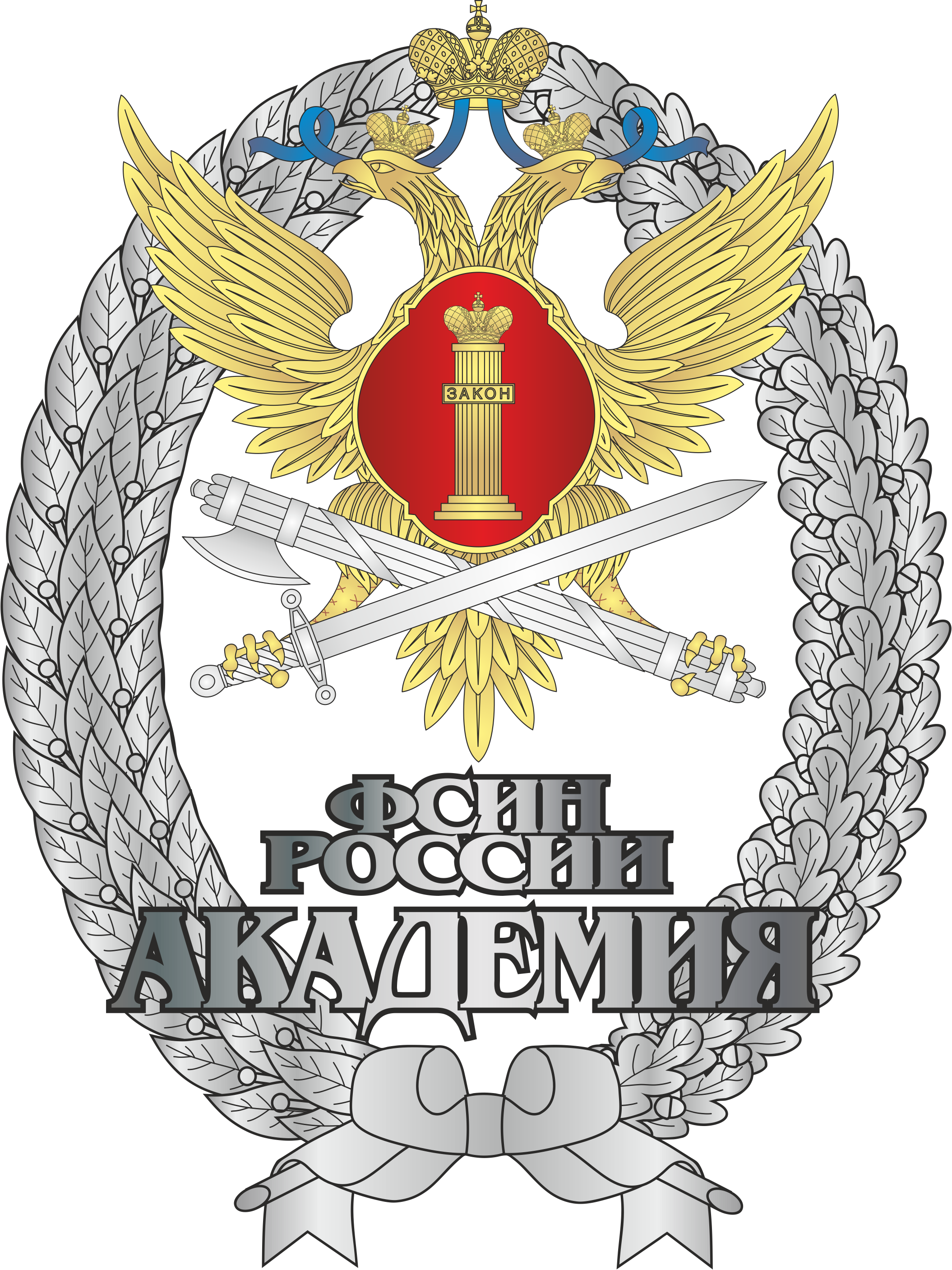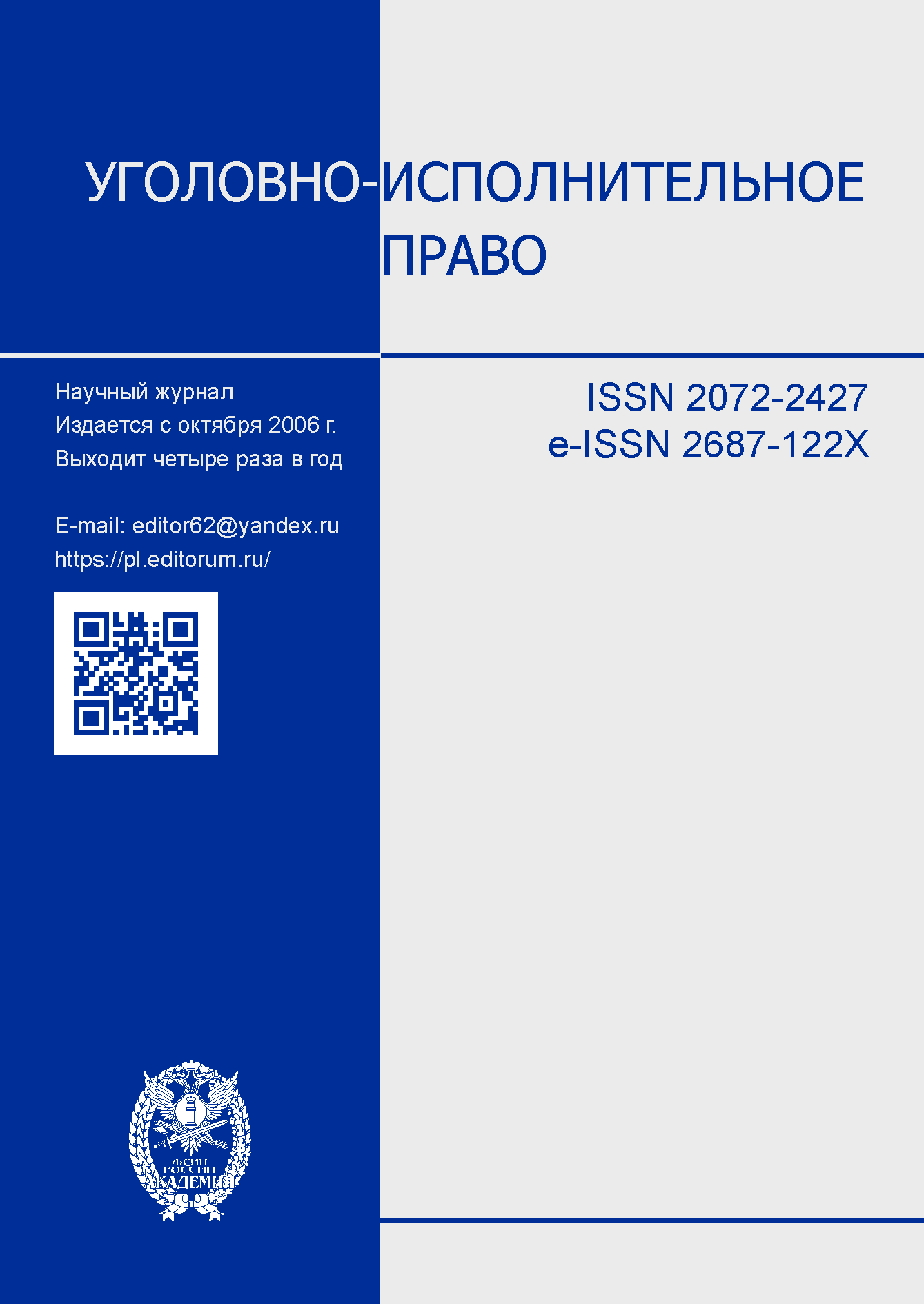Ryazan', Russian Federation
UDC 343.9
The adoption of the Federal Law “On Probation in the Russian Federation”, which has, among other things, a preventive nature, necessitates further development of legislation on combating crime on the example of the Federal Law “On the Basics of the crime prevention system in the Russian Federation”. The article, taking into account the introduction of the institute of probation in Russia, formulates the directions of development of this law: determining the forms of behavior of persons who are the subject of crime prevention, and the validity or unreasonableness of attributing to them non-fulfillment (evasion) of measures provided for by an individual program within the framework of probation; considering the extension of preventive measures to persons released from correctional institutions and correctional centers; comparative study of the legal status of persons in respect of whom measures of individual prevention of offenses are carried out, convicted persons and persons to whom probation is applied; expansion of the list of subjects of prevention and public organizations involved in this; etc. Separately, the need to study educational work as a means is highlighted: the prevention of offenses in accordance with the Federal Law “On the Basics of the crime prevention system in the Russian Federation”, the correction of convicts under the Criminal Code of the Russian Federation, as well as the correction of social behavior of persons in accordance with the Federal Law “On Probation in the Russian Federation” (a similar situation is with the provision of psychological assistance).
countering crime, crime prevention, probation, correction of convicts, educational work, psychological assistance
1. Ermasov, E. V. 2023, ‘Issues of improving regulatory and legal regulation in the field of execution of criminal penalties in the framework of the implementation of Federal Law No. 10-FZ dated February 6, 2023 “On Probation in the Russian Federation”’, in Introduction of probation in the Russian Federation: interaction between government agencies and public organizations, pp. 12–13, Academy of the FPS of Russia, St. Petersburg, Ryazan.
2. Skiba, A. P. & Maloletkina, N. S. 2023, ‘The Law “On Probation in the Russian Federation” as a prerequisite for the further development of penal law’, Bulletin of the Kuzbass Institute, iss. 1(54), pp. 80–90.
3. Naumov, A. V. 2023, ‘On some problems of criminal liability and punishment (“pros” and “cons” of the Federal Law “On Probation in the Russian Federation”)’, in Problems of criminal responsibility and punishment, pp. 140–145, Ryazan.
4. Smirnova, I. G., Nikoljuk, V. V., Markovicheva, E. V. & Kachalova, O. V. 2019, ‘Referral of juvenile convicts to special educational institutions of a closed type’, All-Russian Journal of Criminology, vol. 13, iss. 5, pp. 837–845.
5. Dugenec, A. S. & Samojlova, A. A. 2021, ‘On the issue of improving certain rules and restrictions of administrative supervision of persons released from places of deprivation of liberty’, Administrative law and process, iss. 11, pp. 45–48.
6. Koroleva, M. V. & Mackevich, I. M. 2023, Problems of combating organized crime: textbook, Avenue, Moscow.
7. Petrjanin, A. V. 2018, ‘Directions and features of the prevention of extremist crimes: current state and development prospects’, Union of Criminologists and Criminologists, iss. 1, pp. 115–123.
8. Utkin, V. A. 2019, International law against crime: textbook, KnoRus, Moscow.
9. Jeminov, V. E. & Maksimov, S. V. 2023, Organized crime and corruption: Russian realities and ways to counteract: monograph, Avenue, Moscow.
10. Pobegajlo, Je. F. 2015, ‘Conceptual foundations of modern Russian criminal policy’, Russian criminological view, iss. 1, pp. 279–284.
11. Trufanov, M. E. 2007, Application of the norms of administrative law: Sc.D thesis (Law), Moscow.
12. Skiba, A. P. & Korobova, I. N. 2023, ‘International scientific and practical conference «Development of the system of punishments not related to the isolation of convicts from society. Introduction of the Institute of Probation in the Russian Federation» (November 15, 2023)’, Penal law, vol. 18(1–4), iss. 4, pp. 560–574.
13. Skiba, A. P., Petrjanin, A. V. & Korobova, I. N. 2022, ‘International round table «Probation system in the Russian Federation: penal and other aspects» (November 18, 2022)’, Penal law, vol. 17(1–4), iss. 4, pp. 543–552.
14. Skiba, A. P., Skomoroh, O. A. & Feoktistov, S. V. 2023, ‘All-Russian Scientific and practical Conference «Introduction of probation in the Russian Federation: interaction of state bodies and public organizations» (March 10, 2023)’, Penal law, vol. 18(1–4), iss. 1, pp. 122–131.
15. Kevlja, F. I. 2020, ‘Formation of a healthy lifestyle among minors convicted in places of deprivation of liberty’, Penitentiary science, vol. 14, iss 1(49), pp. 125–130.
16. Kopytkin, S. A. & Gorovoj, V. V. 2018, ‘Organizational and tactical bases of execution of punishment in the form of imprisonment in relation to convicts with socially significant diseases’, Bulletin of the Institute: crime, punishment, correction, iss. 2(42), pp. 22–27.
17. Pavlenko, A. A. 2018, ‘The application of medical measures to prisoners sentenced to imprisonment’, in V. A Utkin (ed.), The penal system: pedagogy, psychology and law : collection of materials of the All-Russian Scientific and Practical Conference: in 2 vols, pp. 173–180, Tomsk.
18. Korjagina, S. A. & Kravchenko, I. O. 2020, ‘Forced labor: reality and prospects’, Baikal Research Journal, vol. 11, iss. 2, pp. 21.
19. Malikov, B. Z. 2021, ‘The essence and legal basis of the use of forced labor’, Man: crime and punishment, vol. 29, iss. 3, pp. 359–365.
20. Pavlenko, A. A. 2023, ‘The medical and legal status of those sentenced to forced labor’, Bulletin of the Tomsk Institute for Advanced Training of employees of the FPS of Russia, iss. 4(18), pp. 90–100.
21. Rastoropov, S. V. & Ul’janov, A. S. 2020, ‘The system of legal restrictions provided for by criminal punishment in the form of forced labor, which determines its legal essence’, Bulletin of the Samara Law Institute, iss. 5(41), pp. 65–70.
22. Kibal’nik, A. G., Volosjuk, P. V. & Abdulgaziev, R. Z. 2019, ‘Russian dissertation research on criminal punishment: the main trends in 2010-2019’, All-Russian Journal of Criminology, vol. 13, iss. 5, pp. 825–836.
23. Shhedrin, N. V. 2015, ‘The new Criminal Code of Russia in the context of social management’, Lex Russica, vol. 100, iss. 3, pp. 48–62.
24. Antonov, I. O. & Shalimov, A. N. 2015, ‘Current problems of fraud investigation using computer information’, Scientific notes of Kazan University. Series: Humanities, vol. 157, iss. 6, pp. 212–220.
25. Ermasov, E. V., Petrjanin, A. V., Rodionov, A. V., Skomoroh, O. A. & Tepljashin, P. V. 2023, Public-private partnership in the penitentiary sphere: monograph, A. P. Skiba (ed.), Academy of the FPS of Russia, Ryazan.
26. Truncevskij, Ju. 2014, ‘Formation and implementation of Russia’s criminal policy in the field of ensuring economic security in a crisis’, Current issues of the innovation economy, iss. 8-1, pp. 92–104.











